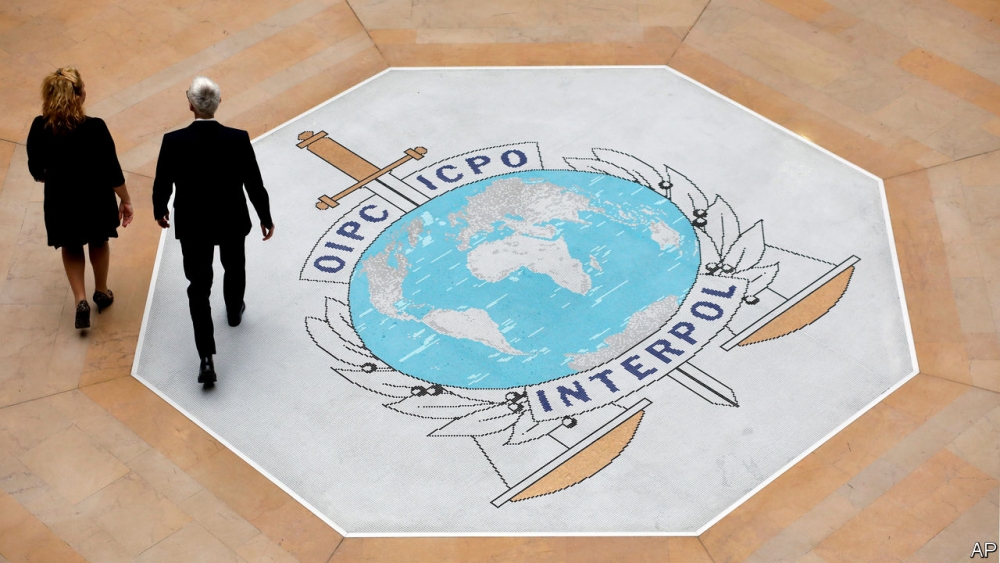IT COULD be the plot of a thriller movie. Shortly after landing in China, the head of an international crime-fighting organisation sends a knife emoji to his wife. Minutes later, he disappears. In the following weeks, a Russian with ties to an authoritarian regime comes tantalisingly close to taking control of the organisation, raising concerns around the globe. Is this fiction? No, it’s Interpol. But what does it do, and why has it been engulfed by so much controversy?
Founded in 1923, Interpol is an international police organisation made up of 194 member countries. It is not a police force in the traditional sense—its agents are not able to arrest criminals. Instead, it is more of an information-sharing network, providing a way for national police forces to co-operate effectively and tackle international crime ranging from human trafficking and terrorism to money laundering and illegal art dealing. The organisation, based in France, operates centralised criminal databases that contain fingerprint records, DNA samples and stolen documents: a treasure trove so valuable that police consulted it 146 times every second in 2017. Interpol’s other main function is to issue notices: alerts to member states for missing or wanted persons. The best-known of these is the “Red Notice”, a notification that a member state would like someone arrested. States are not obliged to follow these notices, but will often treat them as a warrant for someone’s arrest and extradition. “Diffusions”, which can be issued with less bureaucracy, are another popular way of seeking arrests through Interpol.
Notices and diffusions lie at the heart of the organisation’s recent turmoil. Though Interpol’s constitution explicitly forbids any activities of a political character, activists accuse it of failing to enforce this rule. Much of the ire is directed at Russia, which has issued notices and diffusions for the arrest of Kremlin opponents. Bill Browder, an American-born financier who made his fortune in Russia before falling out with the Kremlin and mounting a global lobbying campaign against Vladimir Putin, was briefly detained in Spain earlier this year after one such request from Russia. He claims this has happened multiple times. International groups have also accused China, Iran, Turkey and Tunisia, among others, of abusing the Interpol notice system for authoritarian ends. This has included the issuing of Red Notices for the arrest of refugees, on behalf of the country from which they are fleeing. Interpol often requests the eventual removal of such notices, but cannot ensure this happens.
The anger towards Interpol reached fever pitch earlier this week when Aleksandr Prokopchuk, a Russian with close links to Mr Putin’s regime, was expected to be elected president of the organisation. Critics rather overstated their case in claiming that this would be handing Mr Putin complete control of Interpol, with British MPs going so far as to recommend that Britain should find an alternative made up of “rights-respecting states”. But it is true that the president oversees the big strategic and policy decisions of the organisation, even if the role is mostly ceremonial. In the end, what the Kremlin deemed to be “election meddling” worked. Mr Prokopchuk lost out to a South Korean candidate, Kim Jong Yang. But Mr Kim, who has been acting president since the arrest of Meng Hongwei by Chinese officials, was also caught up in criticism after Interpol accepted Mr Meng’s resignation letter without confirming whether it had been written under coercion from the Chinese government. Activists may be cheered that Mr Kim beat Mr Prokopchuk, but they argue that more reform is needed. Mr Browder, for one, is now campaigning to have Russia suspended from Interpol altogether.
